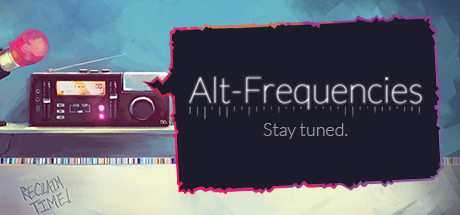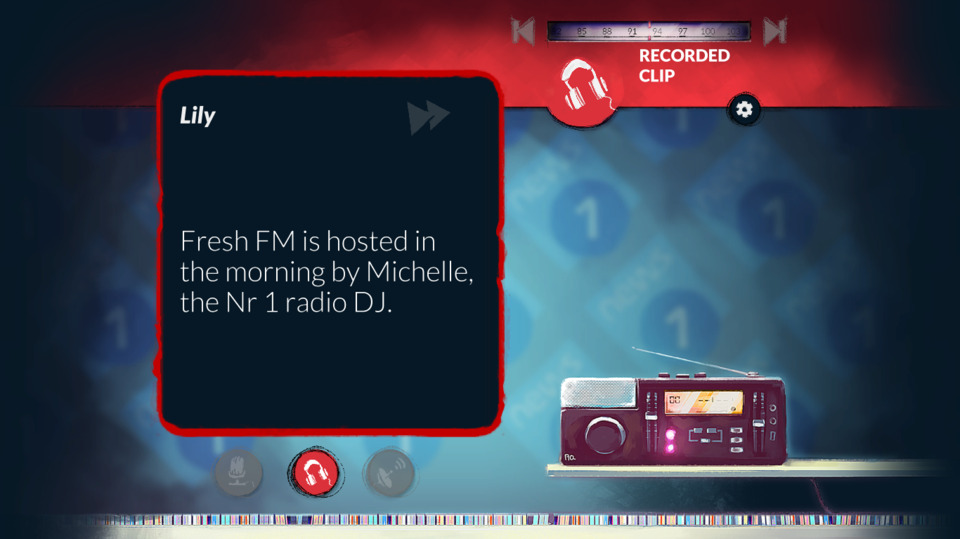Indie Game of the Week 268: Alt-Frequencies
By Mento 0 Comments

If there's three sub-genres I tend to focus on a little too frequently in this feature, it's my beloved explormers, Indie RPGs with a whole lot of curious streamlining, and adventure games that break away from the traditional point-and-click structure. Alt-Frequencies definitely belongs to the last group, developed and published by Accidental Queens who are perhaps best known for their "Lost Phone" franchise of adventure games focused entirely around smartphone interfaces. Those, too, were deviations from the normal LucasFilm/Sierra-inspired games that once defined the genre in its entirety, presenting a mostly epistolary tale where clues were gathered from context found in messages and passwords had to be gleaned by investigating the phone-owner's personal information.
Built like a puzzle game, almost, the goal of Alt-Frequencies is to use special tools to live-record messages from radio broadcasts and send it to other stations in the manner of a call-in message. By recording the right clips and broadcasting them to the right hosts, you progress the plot: one that has the United Kingdom discussing an upcoming vote to implement a "time loop" that will only affect human memory, allowing the country's ecosystem to recover while its citizens relive the same days in their heads over and over for what I think is a set number of loops per unit. However, it's revealed pretty quickly that the time loop has already been activated, and you're one of the few "remembrants" able to retain memories after each loop: it then falls on you and a few other loop-cognizant activists to get the message out about this conspiracy to anyone who might listen. Honestly, the nature of the time loop isn't very well-explained, and I'm piecing together the highly conditional way it affects the world from some perhaps untrustworthy in-game sources, such as interviews with the unscrupulous cabinet minister who secretly activated it to begin with.

The real reason the time loop exists, of course, is so the radio station broadcasts keep looping until you grab the one "live" soundbite you need to progress, sending it to another station that then adjusts their timeline for all subsequent loops, and maybe using a clip from the resulting change elsewhere again as part of a series of steps. It's a clever idea to record clips and modify the recurring trajectory of a station's output for the day - say, a sarcastic talk radio host suddenly going from mocking his callers to being all in on a plan to disruptively flood voting centers with prank call pizzas - but the heavy narrative focus on the time looping quickly makes the process nonsensical. The in-game hint system is there if you get stuck, and the controls for recording and broadcasting these radio clips couldn't be easier (it's literally just three buttons, the third used for playing back the clip you recorded as a reminder), but the fourth-dimensional thinking involved and the way it doesn't quite gel logically is a bit of a snag. It's also a very short game that doesn't take some intriguing ideas - like a particular noise or sound that can be used to decrypt a secret pirate broadcast - far enough, eventually settling into a pattern where you take anything that sounds relevant and sending it to every station until something clicks. Most of the time, the stations will reply with a canned response that suggests the message wasn't relevant enough, requiring you to keep hunting for the path the game intends you to walk.
As the game is simply a static image of a radio with voiceovers piping through it, the voice acting has to be decent by necessity as it's the only thing to focus on. You're listening to the same dozen or so people with every chapter - each on a separate day of the week, leading to the national vote on the time loop plan by Friday, though when and how a looping day suddenly becomes tomorrow is anyone's guess - and they include the aforementioned indifferent talk radio host, a pair of bubbly Radio One type DJs, a serious "investigative journalist" on the game's equivalent of BBC News, and a couple of well-meaning student radio hosts voicing concerns about their futures between cafeteria updates. There's also the pirate radio channel itself that for most of the playthrough provides the instructions you need to be following, if not precisely how you'd go about it (otherwise there'd be no puzzles to solve). All the hosts sound pretty natural in their roles, with clear and concise radio voices, and the game affords you a few methods to play tricks on them with priceless reactions if you find the right (or, perhaps, very wrong) clips to send their way. There's a sense that there might be a branching narrative also - I felt like I might've messed up by sending a clip to the wrong person and getting people killed because of it - but from what I've been able to gather post-playthrough there is only one route and the few branches don't affect it much.

The game feels like a bold experiment throughout, between its short length and sometimes confusing approach to time loops and causality. Like they had the idea for a story based around getting pertinent and damning information out during an illegal time loop but only had so many ways to take it where the plot wouldn't completely fall apart under scrutiny. I'd guess that's probably why they tried to simplify matters as much as possible, providing hints where needed, as well as a tutorial almost the length of a chapter to familiarize players with the game mechanics. I can always respect a game that chooses to take the more interesting route at the potential peril of losing most of its audience, since the inverse is so much more common with the bigger risk-averse publishing studios. On the other hand, I think the implementation of this odd idea has fundamental issues irrespective of the game's otherwise organic presentation and intuitive controls, and might just be a little too obtuse a concept. As I've said many a time before, though, I'm all for any wild swings at new methods to tell stories in games and I'm glad I gave this odd little game a shot. (NB: The game was released as part of Itch.io's enormous Bundle for Ukraine, in case you grabbed it sight unseen and are looking for more of its games to try out.)
Rating: 3 out of 5.
| < Back to 267: The Turing Test | The First 100 | The Second 100 | > Forward to 269: SuperEpic: The Entertainment War |
